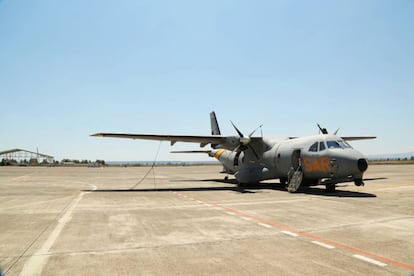Sophia: The EU naval mission without any ships
Launched in 2015 to combat human smuggling in the Mediterranean, the operation has been all but dismantled, symbolizing European division on immigration policy


The Italian air base of Sigonella extends its wire fencing across the green and yellow fields of Sicily, 25 kilometers inland from the island’s coastline. Only the enormous cone of Mount Etna, visible in the distance, stands out over this flat land. Posters depicting a sniper taking aim indicate that this is a restricted-access military zone with armed surveillance.
Inside, there is an enormous city with deserted avenues, runways and hangars. This is the departure point for aircraft patrolling the Central Mediterranean as part of EU Naval Force Mediterranean Operation Sophia, Europe’s military response to the human smuggling rings, launched in 2015. But since March of this year, the planes have been a reflection of a mutilated mission: Sophia is now a naval operation without any ships.
The Spanish detachment in Sigonella has just rotated some of its personnel. A group of newly arrived soldiers are being trained in a small room inside one of the makeshift containers where the group of 39 military members work. The aircraft that they use is standing just a few meters away, on a sun-drenched esplanade that smells of fuel. The plane has been designed for round-the-clock maritime surveillance, and it has a spherical infrared camera fitted on its nose that allows it to locate and identify seagoing vessels, as well as to detect illegal trafficking of people, arms and oil.
If the EU had systematically shown more solidarity with Italy [...] Italian voters would not have made a dramatic swing to the far right
Juan Fernando López Aguilar, EU Civil Liberties Committee
This aircraft was also made to assist in sea rescues. But this activity is no longer taking place, now that there are no ships in the mission. Six aircraft are all that remain of Operation Sophia, which has been all but dismantled. Nobody would venture to say whether its mandate will be extended beyond the current deadline of September 30.
The planes at Sigonella continue to patrol the Central Mediterranean and collect information to meet the ambitious if vague goal that triggered the mission back at the height of the refugee crisis: “To disrupt the business of human and weapons smuggling.” The operation’s most controversial task is still being carried out as well: training Libya’s Coast Guard so they will do the job of intercepting vessels filled with people fleeing Libyan war and chaos, and return them to the point of departure. Even official sources of Europe’s diplomatic service admitted, in a written reply, that the temporary suspension of naval assets “is not optimal,” and that the mission’s ability to fulfill its mandate “is more limited.”
In these four years, the mission has had some tangible achievements: the arrest of 151 individuals suspected of human trafficking and smuggling, and the destruction of 551 boats used by criminal networks. Operation Sophia has also inspected three ships and seized banned goods; it has made radio contact with 2,462 vessels to check their identity, and made 161 friendly approaches. For European diplomats, the mission has been mainly useful in “significantly reducing smugglers’ ability to operate in high seas” and has generally contributed to “improving maritime safety and stability in the Central Mediterranean.”
Sophia’s main mission was never to rescue people at sea, yet in these last years it has saved 45,000 lives, following the maritime obligation to aid people in distress. The reason why it has been stripped of its ships – a move that has been strongly criticized by non-profit groups – can be found 800 kilometers north of Sicily, in Rome, and also in the offices of European politicians. Last summer, Italy’s far-right Interior Minister Matteo Salvini began to apply a closed-port policy for ships carrying rescued migrants unless a previous relocation agreement existed with other countries. Salvini first targeted the non-profit groups performing sea rescues, and then he warned his European colleagues that Italy, which is leading the EU mission, would refuse to take in all the rescued migrants without first seeing a change in EU policy. A year later, no European deal has emerged, and every time a rescue is made, the issue of who takes in the migrants is negotiated on an ad hoc basis.
Operation Sophia has saved 45,000 lives
Although arrivals through this route have plummeted, Salvini insists that “Italy is not willing to accept all the migrants who arrive in Europe.” Political division among member states has had an effect on the European military mission. “Sophia has not been conducting rescues since August 2018,” says Matteo Villa, a migration expert at Italy’s Institute for International Policy Studies (ISPI). “Nobody in the EU wanted to see a mission ship with migrants on board being refused port entry, so the ‘solution’ was to suspend Sophia’s naval tasks.”
The decision to maintain the operation without any ships was made at the last minute in March, in a move that prevented the dismantling of the mission just ahead of the European elections. “Operation Sophia has helped save lives, although that was not its main objective. It was a mistake for [the EU] to leave it with nothing but airplanes, without the ships that were able to save lives,” says Matteo de Bellis, a migration and refugee expert at Amnesty International. “What they are doing now, training the Libyans, only serves to empower the forces that intercept refugees and migrants and return them to Libya, where they face arbitrary detention in centers where there is torture, exploitation and rape.”
Ever since the great maritime rescue operation developed by Italy in 2013, the Mare Nostrum, which saved 150,000 people, its European successors have been less ambitious in scope and their goals more focused on security and border patrolling. This is the case with Sophia, which by training the Libyan Coast Guard is contributing to the increasingly clear strategy of outsourcing EU migratory control, even to a country mired in chaos and war. “If Europe reduces search-and-rescue operations and encourages Libya to conduct them in its place, then it is being an accomplice to the violations taking place in Libya,” says Catherine Wollard, secretary general of the non-profit network integrated in the European Council of Refugees and Exiles (ECRE).
Training the Libyans only serves to empower the forces that intercept refugees and migrants and return them to Libya, where they face torture, exploitation and rape
Matteo de Bellis, Amnesty International
The vision offered by official European sources regarding the training of the Libyan Coast Guard, and about Operation Sophia in general, is very different when it comes to reducing mortality on the Mediterranean’s most deadly migration route. “Operation Sophia was launched to fight criminal human smuggling networks that put lives at risk in the Central Mediterranean,” they say in a written response. European officials are aware of what is going on in Libya, but their response to the accusations of abuse perpetrated by the Libyan Coast Guard and the situation of migrants confined in detention centers in terrible conditions, is the following: “Everything that happens in Libyan territorial waters is Libya’s responsibility, not Europe’s, yet we are not looking the other way. […] Through Operation Sophia we have saved lives, fought traffickers and trained the Libyan Coast Guard […]. We are performing this last task because substantial loss of life at sea is taking place within Libyan territorial waters. That is why it is very important for Libya’s Coast Guard and Navy to know how to assist distressed migrants in line with international law and humanitarian standards. Also, because the contribution of Libya’s Coast Guard in the fight against traffickers operating in their waters is indispensable.”
Criticism of Operation Sophia is also coming from the European Parliament, which funded the trip that made this feature story possible. Juan Fernando López Aguilar, president of the parliament’s Committee on Civil Liberties, Justice and Home Affairs, attacks the decision to strip Sophia of its naval resources. The Socialist Party (PSOE) politician says that this decision was made “in the absolute absence of a global approach to the migration phenomenon that would include cooperative coordination of all the resources at member states’ disposal, such as development aid in Africa, cooperation with origin and transit countries, hirings in countries of origin and the creation of legal ways to access the EU. Now that would dismantle [the mafias’] business model,” he says.
López Aguilar says that the EU is aware of Italy’s weariness of the situation, considering that “for years it dealt with a migratory pressure that exceeded its response capacity.” Between 2014 and 2017, around 624,000 people landed on Italy’s coasts. “If they EU had systematically shown more solidarity with Italy, if relocation programs for people in hotspots had been observed, very likely Italian voters would not have made a dramatic swing giving victory to the far right, nor would we have reached a point where a xenophobic closed-port narrative is claimed to represent the salvation of Italian interests.”
Miguel Urbán, a European Member of Parliament for the Spanish leftist party Unidas Podemos, is highly critical of the way the EU has been managing immigration. He talks about a “militarization of the Mediterranean” and describes European policy as bowing to “the far right’s strategy.” He blames Italy’s attitude for turning Sophia into “an operation in the Mediterranean without a naval fleet. What the Italian government gets out of this is to rid itself of its humanitarian responsibility to disembark migrants on its coasts.”
For now, no progress has been made on the underlying political problem of disembarkation and, by extension, on the long-delayed reform of the Dublin Regulation to balance out frontline states’ responsibility in taking in refugees with solidarity from other countries. Sophia will continue to hobble along until September after being all but given up for dead in March. After that, everything is still up in the air.
Human rights courses for the Libyan Coast Guard
Although the situation of the 50,000 refugees and asylum seekers trapped in Libya is desperate, the EU is forging ahead with its plan to support the Libyan Coast Guard. It has earmarked €87.2 million to train its members and provide them with technical and logistical support – Italy is in charge of this latter issue – that will enable them to intercept boats departing from Libya and take its occupants back to their departure point. The Coast Guard is also being trained in rescue operations in the enormous section of sea that they have been assigned.
Military personnel from Operation Sophia are in charge of this training. So far, 417 members of the Libyan Coast Guard and Navy have received courses in Italy, Greece, Malta, Croatia and Spain. In written answers, official European sources said that before going through the courses, trainees undergo “a rigorous selection process.”
This is no minor issue, as several members of the Libyan Coast Guard have been involved in accusations of human smuggling, migrant abuse, aggressive attitudes towards non-profit groups, and inefficient – if not downright reckless – rescue operations.
Instructors teach trainees about “search-and-rescue procedures, first aid, international human rights legislation, maritime law, the fight against illegal trafficking, evidence gathering, navigation and asylum request procedures.”
The same sources underscored “the strong emphasis on respect for human rights, including the rights of women, and a correct treatment of migrants.” The human rights courses are taught in collaboration with UNHCR, the United Nations’ refugee agency, the International Organization for Migration and Frontex, the European border and coast guard agency. In 2017, the UE established a mechanism to supervise the effectiveness of the training and the Libyan agency’s ability to carry out its duties.
English version by Susana Urra.